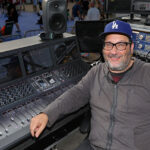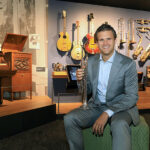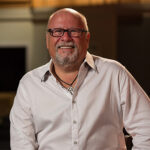Live engineer Jay Phebus is a lucky man. He has been mixing a band he loves, King's X, for more than two decades. Since 1984, when King's X was still a Midwestern circuit band, he has been their soundman, and by the early '90s he had also taken over as their tour manager following a string of short-lived TMs, which has made his job challenging, to say the least. While attending the University of Mississippi Phebus originally intended to enter the Air Force, but allergies prevented his admission into the flight program, so he answered the call when King's X–bassist/vocalist Doug Pinnick, guitarist Ty Tabor and drummer Jerry Gaskill–needed help and left school. Since then, he has toured the world with them, from headlining club gigs to opening slots for AC/DC. During downtime, he has mixed other artists, including Stevie Wonder, Vertical Horizon, Eric Gales, Galactic Cowboys and George Thorogood. What makes Phebus' story all the more inspiring is that he has no formal training as a soundman. Everything he has learned has been through hands-on experience. He says he has an affinity for computers and would have jumped into that world after college had the timing been right. But after being on the road with King's X for a decade, the band decided to start delving into computers with 1994's Dogman album. Ironically, rock 'n' roll brought Phebus to where he would have gone anyway.
Phebus spoke to FRONT of HOUSE just prior to the start of the recent King's X tour, and he went in-depth about the art of juggling jobs and the joy of mixing, along with great product endorsements.
FOH: So how do you balance your schedule with King's X and other bands?
Jay Phebus: As soon as our touring schedule dropped to the point where it did after we were signed, every year, I've done something else. Last spring, I did 10 weeks with Steve Vai, then also continued over to Japan immediately following the U.S. completion. There are times when it works where I'll hop off a plane on Sunday, on Monday go to a festival, then hop right up with King's X. Two years ago, I finished King's X, stayed in Houston a day, then hopped a plane to Europe for Anthrax. It dovetails together like that. There are so many big gaps in the King's X schedule that I'll do assorted other touring. I've been doing that for years.
So you do two jobs at once?
Yeah, and I've done that with a lot of other bands. I talked about that with Steve Vai and his manager last year. He realized that I'm doing two jobs, and there are going to be sacri- fices, and there's no way that it cannot be that way. The jobs overlap. One of the main things is, typically, when you're mixing the show, the tour manager is doing business with the promoter and settling the show. I can't do that. That's one of the main conflicts.
The other thing is all during the afternoon, when the tour manager's taking care of all the problems, the sound engineer is doing sound check and getting things working with sound, so that causes problems as well. There will be times when the crew's waiting around for you to do sound check. "Where's the sound guy?" "Well, the tour manager's got him detained at the moment." Those are the kinds of things that are hectic and frustrating.
What advice would you give to somebody who's attempting to take on both roles?
You've got to have an understanding of the band and crew, and you yourself have to have a lot of patience. I remember one time last year when I was out with Steve, I had two bus drivers in the front lounge, which I take over and make a mobile office with my laptop and printer. I intentionally went on that tour with a full digital console so I could get away with going in there 15 minutes ahead of time, so as soon I was plugged in, I was 90% of the way there. I didn't have any effects to patch up, no inserts. Everything was built into the console. I had to economize my time. You have to be creative to make those types of things work.
Anyway, Steve comes up and wants to go the gym, and I'm going, "I'm right in the middle of taking care of our receipts with our bus drivers. I haven't even set foot in the venue to get sound check on the way." He just looked at me and said, "Don't worry about it. I'll get Dave [the production manager] to take care of it." He realized it was one of those conflicting times where if you're the man and want me to take care of it, I'll drop everything, but I'll let you make an educated decision as to where you want me to be spending my time and energy right now.
There are times when it gets even more complicated than that. There are more things that you're involved with at one time. There is no telling how many times throughout King's X's tour career that I've been at Front of House–and I know it gets frustrating for the guys because I'm taking care of assorted different business with the tour management– and I'll have phone calls that stop sound check. A lot of times I just want to get a voicemail, but during certain times when certain critical things are coming up and there is time-sensitive business that I have to take care of, sound check will come to a grinding halt. We've all been doing this for so long that it's old hat for us now. Starting out or working with new clients doing that sort of thing can be trying and testing at times. I have to admit that there were times out on the Vai tour where it was quite difficult. The longer you do it and the more patience everyone involved has when you're doing something that of nature, the better it is.
So on this current King's X tour, what console are you taking out?
I'm taking the Allen & Heath GL3800, the newest generation of the 32-channel mainframe. I've used Allen & Heaths before, so I was very familiar with it, and this was the newest line that they had out. I am hoping to get a chance to take out their new digital console out as well. It's just now hitting the road, although it would be way more than I need for what we're doing.
At this point, I have other endorsements with outboard gear. Paul Snyder at Four Star Wire and Cable does all our cabling. That's one of the main things that's helped us have consistency and quality night in and night out. It makes such a huge difference. When you go into a gig, and you're relying on them for mic cabling, drum looms, a snake or whatnot… Paul and his products are fantastic. He's trying to do an article with Jerry about the new drum loom. He came out to our show last year. We've been using his drum loom for the past couple of years.
As a matter of fact, I called Paul up and took out an entire stage-wiring kit with Vai. He has really nice cable bags that really haven't even hit the market. I don't think anybody's really tapped into that. They're like round canvas bags that you can roll up and put all your assorted cabling and looms and whatnot from the stage. It's an incredibly good way to keep track of all your cabling, store it, transport it, everything. That's made a huge difference. When I get to a gig now, I don't have to worry about whether their outboard gear works. The last piece of the puzzle was having my own console, so when that came into play, I've got my own rack and my own cabling to integrate into things.
There was one time I had a rash of bad consoles. It was one of those boiling points, and I had had more than I could take. I was tired of these piece of crap consoles day in and day out. It was very, very frustrating, so when we got together with Rob Joseph–a close friend and colleague of mine who's an independent rep in the Midwest for Alesis, V-DOSC, Lake Audio and dbx–he got me hooked up with Gabe at American Music & Sound [exclusive U.S. distributor of Allen & Heath]. On the last tour, he knew my situation. We had had a previous endorsement for a monitor rig with some processing and a console that we ran PMs through. It only lasted about one or two legs of a tour and started developing a whole lot of problems.
Basically, a couple of days before we took off on the last tour, he gave me Gabe's number and thought he got us a Front of House console. To be honest with you, I hadn't had a long-run experience with Allen & Heath, but that console is as clean as anything that's out there right now, and I've gone head-to-head with many consoles. The odd thing is that a lot of these venues we've played year in and year out got new consoles. Great, I get my own console, and they get a new console, but I still would run all the house consoles straight through my console. It only took a couple of brand-new Soundcrafts or brandnew Midases, and my console was every bit as clean or cleaner than theirs. I realized that I'm already pre-dialed in, so we ran through my console. That's how we ran the whole tour. It's just a well-oiled machine at this point.
All I ask for from the venue is that the stuff works. At this point, all I'm asking for is the drive line. Racks and stacks, because I'm bringing everything else. Your board doesn't even have to work. I just need the snake to get to the stage, and the amps, cabling and speakers to work. I've eliminated it all to that. I don't care if any of your microphones work. I don't care if you don't have any mic cables. You don't need even to have mic stands. We bring our own. Usually, when King's X is leaving, the crews are going, "Dang, I wish every band was like this!" We're packing so much gear, we're virtually self-contained. We've done it in the way it should be attacked sonically. Then again, King's X is a musician's band. You want to hear what they're doing. It doesn't matter if they've got flash pots or if their makeup is right tonight or they've got that leather jacket on. The show is them and their talent, which is cool. I dig that about them. And I love my job mixing. It's my passion.
So how much changes every year with King's X?
It doesn't really, per se. We start up next week. My console's been packed up in a case in a trailer. We'll have a reference point where we started from last time. The guys are constantly evolving their rigs. We have beyerdynamic, another huge piece of the sonic puzzle. Beyer has been there for us year in and year out, and Paul Froula, our rep that's there now. They even had us for an appearance and signing at their booth at NAMM this past January.
Beyer is crucial. We have every microphone we ever need and then some. Sonically, it's an excellent product, and the consistency night in and night out is just a night and day difference from 10 years ago when we didn't have all these pieces of the puzzle in place. It was the same thing with Vai. I got my cabling endorsement from Four Star and brought all my beyer mics as well, so I had a big consistency night in and night out, which is a wonderful thing to have.
Each of my guys has endorsements that have been supporting us for several years. All of them are an important ingredient for our consistent and superb sound. Steve "Doc" Dachroeden at AMPEG is Doug's longest-standing endorser. Tony Pinheiro at DR Strings has supported Ty and Doug for years. They won't play anything else. Rich Mangicaro at Piaste Cymbals is one of our longest supporters. Jerry loves their cymbals, and I don't know what we would have done without them. Ken Dapron at Yamaha Guitar Development, and John Gedusi, our builder, have also supported Ty and Doug for years with guitars and basses. They're second to none! As you might have already noticed, we only endorse products that we actually use and love. King's X has always stood for integrity and quality, from the music they write to the products we endorse.



